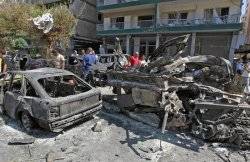Mourners in Lebanon have buried dozens killed in twin bombings in the city of Tripoli a day earlier as the country observed a day of national mourning under tight security.
Friday's attack - the deadliest in Lebanon since its 1975-1990 civil war - drew strong condemnation from the international community.
On Saturday, security forces arrested a suspect in connection with the blasts that killed 47 people.
The National News Agency identified the suspect as Sheik Ahmad al-Ghareeb, and said police took him into custody at his home in the Miniyeh region outside Tripoli.
It said al-Ghareeb, who has ties to a Sunni organization that enjoys good relations with Lebanon's powerful Shia Hezbollah group, appears in surveillance video at the site of one of the explosions.
Meanwhile, soldiers in armored vehicles patrolled Tripoli, which has been split by strife over Syria's conflict.
Al Jazeera’s Zeina Khodr said anger was at an all-time high in the city.
Syrians split over Syria
While the Lebanese government's official position on Syria is one of neutrality, both Hezbollah and radical Sunni groups in Lebanon have sent fighters into Syria to fight on opposing sides.
There has been no claim of responsibility for the blasts, but people in the city are pointing the finger at the Syrian government and its ally, Hezbollah.
Hezbollah in a statement condemned the blasts and expressed solidarity with the victims, saying they were targets of efforts to fan more violence in Lebanon.
"We consider this the completion of an effort to plunge Lebanon into chaos and destruction," the statement said.
The explosions in Tripoli, 70 km away from the capital Beirut, came a week after a huge car bomb killed at least 27 people in a Shia district of Beirut controlled by Hezbollah.
PHOTO CAPTION
People stand next to destroyed cars at the site of an explosion in front of the Al-Salam mosque in the northern city of Tripoli, Lebanon, 24 August 2013.
Aljazeera


 Home
Home Discover Islam
Discover Islam Quran Recitations
Quran Recitations Lectures
Lectures
 Fatwa
Fatwa Articles
Articles Fiqh
Fiqh E-Books
E-Books Boys & Girls
Boys & Girls  Women
Women










